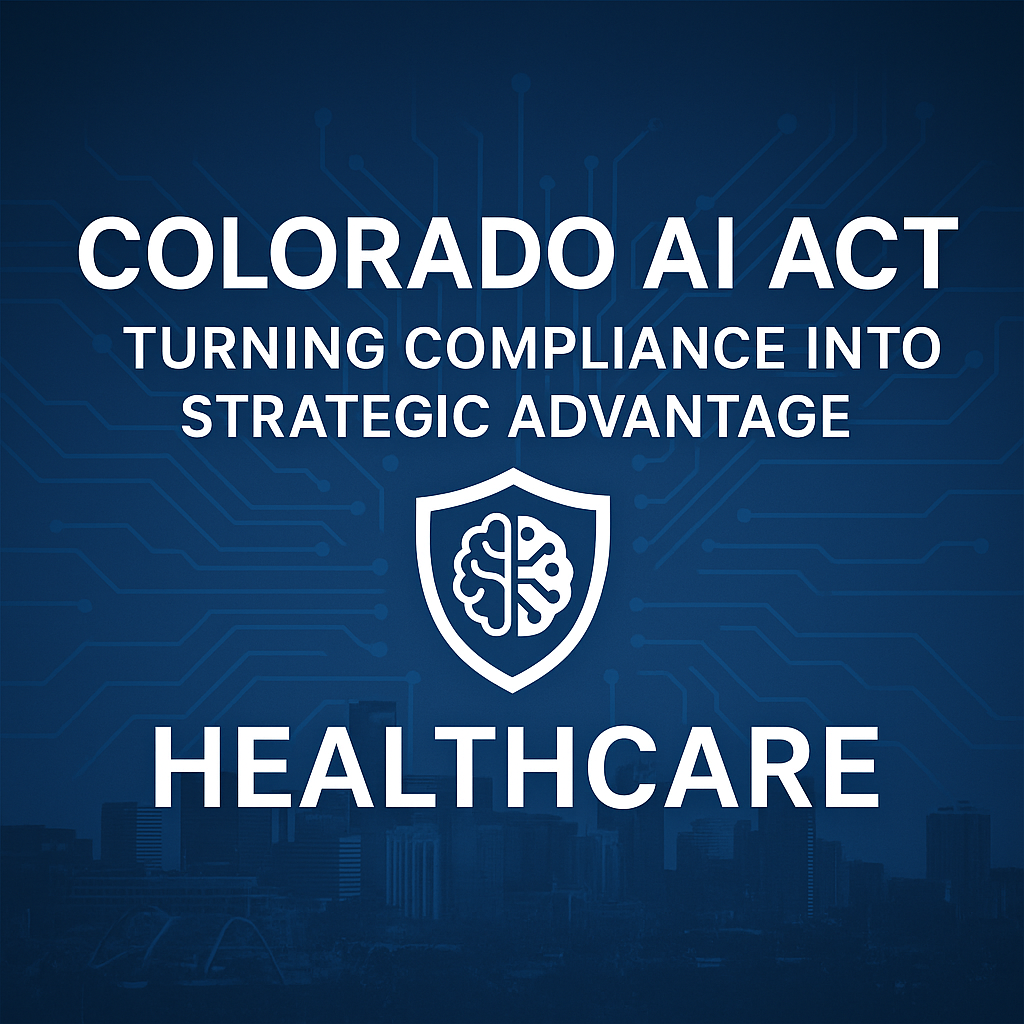AI Readiness Assessment for Manufacturers: A Practical 5-Step Framework
AI is flooding the manufacturing space with promises of higher uptime, better quality, and smarter decisions. But most plants aren’t built to handle...
4 min read
 Ryan Orton
:
Updated on November 19, 2025
Ryan Orton
:
Updated on November 19, 2025

The Colorado Artificial Intelligence Act (SB 24-205) marks a pivotal moment for healthcare organizations, introducing regulatory requirements that begin June 30, 2026, with enforcement led by the Colorado Attorney General. Signed into law on May 17, 2024, the Act made Colorado the first U.S. state to enact broad regulation of high-risk AI systems. It was originally scheduled to take effect on February 1, 2026, but lawmakers later amended the effective date to June 30, 2026 following legislative debate.
Organizations can approach this mandate with a compliance only mindset, viewing it as a necessary cost. Alternatively, they can embrace a strategy driven approach, leveraging compliance as an opportunity to enhance internal capabilities and create a sustainable advantage.
Those who proactively build robust frameworks for AI governance and risk management today will be best positioned to realize compounded value as broader AI adoption accelerates across the healthcare sector.
Many healthcare leaders understandably view the new law as another mandated cost. But a shift in perspective reveals something more valuable: the systems and processes required for compliance are the same ones needed to accelerate innovation, strengthen governance, and future-proof operations.
Thinking in terms of long-term goals rather than immediate obligations helps organizations convert regulatory pressure into meaningful performance gains. The Act requires investment—what determines ROI is whether that investment is treated as an expense or a strategic asset.
Organizations that approach SB 24-205 with a strategic mindset will build capabilities that compound value as AI adoption accelerates across the industry.
Below are five strategic opportunities created by the Act—and how they unlock measurable advantage for early movers.
A persistent challenge in healthcare is the visibility gap: leaders cannot make informed decisions about AI when they lack a complete picture of where and how it is used.
Preparing for compliance requires organizations to compile a full inventory of all data assets and AI-enabled systems—including EHR modules and third-party tools with embedded, high-risk AI.
Under the Act, a “high-risk AI system” is defined as one that “makes, or is a substantial factor in making, a consequential decision,” including decisions that affect healthcare services or the cost and terms of care. This inventory becomes the foundation of enterprise-wide portfolio management.
Understanding each system’s purpose, patient impact, integration points, ownership, and contractual terms enables executives to:
eliminate redundant tools
consolidate misaligned technologies
reallocate investments toward high-value use cases
This clarity transforms an operational requirement into a strategic intelligence layer. One large health system, for example, discovered more than 40 undocumented AI-enabled tools during its first inventory—insight that allowed leaders to reduce cost, strengthen governance, and target innovation more effectively.
SB 24-205 requires organizations to establish a risk management policy and program—not at the departmental level, but at the executive level. This single requirement fundamentally reshapes how AI is governed.
Today, AI decisions often sit in fragmented silos across IT, clinical teams, and legal departments. The new expectations elevate AI from a technical concern to an enterprise priority, creating C-suite accountability and board-level oversight.
This shift unlocks three major advantages:
Faster identification and deployment of AI opportunities
Clearer alignment between AI investments and organizational goals
Stronger ROI from AI-enabled initiatives
Organizations that mature their governance model early will move faster and with more confidence as AI capabilities expand. Executive-level governance is no longer optional—it is a multiplier for speed, quality, and resilience.
The law’s requirement for impact assessments pushes organizations to rigorously test, validate, and monitor high-risk AI systems. SB 24-205 requires deployers to conduct an annual impact assessment, retest systems following any “intentional and substantial modification,” and retain assessment records for at least three years.
These obligations reinforce the need for ongoing, real-world validation rather than one-time evaluations. Though often perceived as a compliance burden, this work directly reduces clinical and operational risk.
Vendor-provided model performance rarely matches the realities of patient populations, workflows, and environmental variables. Independent evaluation is essential to avoid silent degradation where models deteriorate without detection and the potential harms that follow.
Organizations that adopt continuous testing and monitoring see measurable gains:
reduced algorithmic bias
improved reliability in clinical decision support
higher clinician trust and adoption
early detection of model drift
For example, a regional provider that implemented real-world validation protocols saw a 20% reduction in error rates across several AI-enabled tools within six months.
Testing may begin as a mandate, but it quickly becomes a driver of better, safer, more equitable outcomes.
Patients increasingly expect to know when AI is involved in their care. SB 24-205’s clarity and disclosure requirements create a new, legitimate avenue for organizations to communicate openly about how AI supports clinical decision-making.
Instead of treating disclosure as a checklist task, healthcare leaders can use it to:
demystify AI
differentiate their brand
strengthen patient engagement
reinforce their commitment to ethical care
Organizations that lead with transparency can convert mandated communication into a marketing advantage. One healthcare network that proactively disclosed AI use in triage and scheduling saw a notable uptick in patient satisfaction metrics—simply because patients felt more informed and respected.
Trust is becoming as important as accuracy in AI-enabled care. Transparency builds both.
Top candidates evaluate employers not only on their adoption of AI but on how responsibly and ethically that AI is governed.
Mature AI ethics programs, built on clear governance, ongoing monitoring, and transparent communication, signal a forward-looking culture. They also attract skilled talent who want to work for organizations that understand both the risks and the rewards of emerging technologies.
For organizations competing for clinical, technical, and analytical talent, ethical AI is becoming a differentiator. It shapes culture, influences retention, and communicates a commitment to integrity and innovation.
In a tight labor market, this advantage is significant.
The Colorado AI Act presents two diverging paths. First, organizations that do the bare minimum will incur cost and complexity with little long-term benefit. Second, organizations that build strategic capabilities will create scalable, future-ready infrastructure that outlasts the regulation itself.
Compliance systems, once integrated into daily operations, reduce risk, improve decision-making, and convert raw data into insight. More importantly, they prepare organizations for the regulatory cascade ahead, the likelihood that federal and multi-state AI legislation will follow Colorado’s lead. Colorado’s transparency, documentation, and risk-management obligations closely reflect the core elements of the proposed EU AI Act, indicating the broader regulatory direction that U.S. healthcare organizations should expect in the coming years.
AI is transforming healthcare at a rapid pace, and regulatory expectations will evolve alongside it. The capabilities built now become long-term strategic assets. Organizations that lead today will set the standards for tomorrow, while those who lag behind risk adapting to frameworks built by others.
RubinBrown’s AI Consulting Team can help your organization transform Colorado’s 2026 AI Act requirements into strategic capabilities that strengthen governance, compliance, and responsible innovation. Whether your business operates in Colorado or another state, our experts are ready to guide your next steps with practical, AI-driven solutions. Schedule a call today to discuss your AI readiness strategy and compliance roadmap.

AI is flooding the manufacturing space with promises of higher uptime, better quality, and smarter decisions. But most plants aren’t built to handle...

Manufacturers understand in today’s digital-first world that embracing digital transformation is no longer an option but a necessity but implementing...

In today's fast-paced and dynamic business landscape, organizations are constantly seeking ways to enhance their operational efficiency, make...